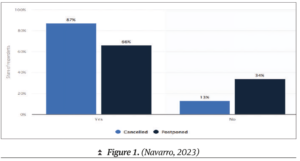Research objectives
This study aims to understand the importance of event management companies and how they have been affected during the covid-19 pandemic.
Keywords:
Event management, Covid-19, Impacts, Industry
Bio
Mr. Keyur Sheth is the founder and Managing Director of Red Cherry Entertainment. He is a Man of many shades with numerous talents. Mr. Keyur Sheth is a businessman and has been active in the field of Media, Artist Management and Event Management for many years. He has executed multiple reality shows for Indian Hindi channels, he is a Brand Influencer Marketing and has organised numerous Live Concerts with top A list Artists from India and Internationally while organising Corporate events and much more. He has received several accolades and awards for successfully running this company from such a young age. Red Cherry Entertainment is successful globally over a period of 15 years. Recently Mr. Keyur Sheth has received the ‘2nd Dadasaheb Phalke Icon awards Films International 2023 Dubai’ as the ‘Youngest Entrepreneur in the Entertainment Industry’.
Abstract
Event management has become a societal norm through which individuals can undergo the process of creating and maintaining an event. Events are beneficial for individuals within societies to cultivate personal connections and network with individuals from different backgrounds. Through events, individuals within societies can appeal to target audiences, collaborate with future partners, identify sponsors, promote their work and improve their wellbeing. Historically, face-to-face interaction has been deemed as a dominant element of event management. This was affected by the unprecedented events of the covid-19 pandemic. This study aims to understand the importance of event management companies and how they have been affected during the covid-19 pandemic. Recommendations have been made to facilitate event management companies in contemporary life post-pandemic. A review of literature sources has been utilised for this study. Results have indicated the following: event management companies can provide creative ideas to help to ensure success and taking the pressure of organisers. In addition, economic impact on event management industries, social effects, and virtual event management has been discussed. This study has concluded that in the new normal world, face-to face events have resumed through utilising adapted strategies. Technology should be utilised as a tool to enhance event management; however financial planning is important for future events that may occur in an everchanging uncertain society.
Introduction
Event management has become a societal norm through which individuals can undergo the process of creating and maintaining an event. It can be defined as a well organised and well-planned occasion “with the view of meeting or achieving specific objectives for the benefit of a person, group of people, or an organization” (Mohd Kodri, et al., 2022). Event planners are the professionals within the business. Events are beneficial for individuals within societies to cultivate personal connections and network with other individuals from different backgrounds. Through events, individuals within societies can appeal to target audiences, collaborate with future partners, identify sponsors, promote their work, exchange ideas, participate in cultural activities, entertain their guests and improve their wellbeing. Events bring people together and are a platform for to create memories, celebrate and express themselves regardless of if it is a business venture, marriage, funeral or a live concert (Jones, 2017). In addition, large or small events are important despite it being for the purpose of making a profit including corporate business functions, exhibitions, parties or social events. Historically, face-to-face interaction has been deemed as a dominant element of event management. People interact with each other on a daily basis, hence the demand for organising events is high. Event managers are required to follow their client’s wishes and their preferred choices, all within the agreed budget agreed prior to the event.
Event management industries were affected by the unprecedented events of the coronavirus (covid-19) pandemic. The covid-19 pandemic caused global catastrophe affecting societies economically and socially. Many event management companies had to cease operation and cancel all live events and concerts that were due to take place. It was necessary for everyone to comply with regulations devised by national and international governing bodies to reduce transmission of covid-19. Global artists, performers and organisers all complied with the regulations and many refunded ticket sales or differed the purchases towards the next concert dates post-pandemic. Event management practitioners were required to find different methods through which they could sustain their companies (Madray, 2020).
In April 2020, research has illustrated within Figure 1 that eighty-seven percent of individuals participating in a survey held in America cancelled the events that they had planned, while sixty-six percent of then postponed them. It was suggested that many events were not cancelled during February 2020 however, the cancellation rates increased during the months between March 2020 and June 2020, largely due to governing body regulations of social distancing and bans on travel to ensure minimum transition of the virus.
Objectives
This study aims to understand the importance of event management companies and how they have been affected during the covid-19 pandemic. Recommendations have been made to facilitate event management companies in contemporary life post-pandemic. A review of literature sources has been utilised for this study using published and grey literature sources.
Results and Discussion
Results have indicated the following: event management companies can provide creative ideas to help facilitate success through taking the pressure of organisers. In addition, economic impact on event management industries, social effects, and virtual event management has been discussed.
Economic impact on event management industries
The event management industry is regarded as an important contributor of economic growth within nations around the world and is deemed as a sector of tourism that attracts the masses (Janiszewska, et al., 2021). The rapid growth of this industry pre-pandemic enabled local areas to thrive, as tourists heightened economic growth in areas. However, the covid-19 pandemic led to a dramatic reduction in the number of individuals that visited local regions affecting their economies. According to research more than six hundred and sixty-six million US dollars were lost due to event cancellations and approximately eighty-five employment positions were compromised (Mohd Kodri, et al., 2022).
Many companies within the event management industry participated in practices that were not organised well and very few events were held. It was only when governing bodies allowed the integration of individuals within their bubbles and in controlled environments that event management industries started to offer face to face services for events again from August 2020. In attempt to increase revenue and sustain businesses, event management companies started to utilise technological mediums to generate income. This was in the form of online webinars, live group chats and created live shows. Although attempts were made to generate revenue through this method, it was unmatched to the profit attained from face-to-face events. Although it was necessary for governing bodies to implement lockdown measures to protect global societies against the virus, it has created a great impact on global economies which is affecting nations in contemporary life.
Social effects
The lockdown regulations imposed by local and international governments contributed towards individuals staying away from public events or any gatherings. Social lives of individuals were affected as staying at home became habitual and a routine (Somani, 2021). Therefore, even when restrictions were lifted, individuals faced fears of travelling thus there was a reduction in the number of people attending public events. Research has also revealed heightened negative mental health impacts on individuals due to the covid-19 pandemic (Somani, The Impact of COVID-19 on Human Psychology, 2020). Hence attending social events, meeting new people, and listening to music have been highlighted as ways through which stress, anxiety and depression can be reduced. Event management companies have been required to ensure that they meet the needs of their clients while making certain that they network effectively and generate revenue. Events have the ability to heighten the onset of creating change as people are integrated together on one platform, and thus they can identify with the event and understand the cause that they are attending. Hence, face to face physical events provide golden opportunities for individuals to build relationships by combining emotions and creating impressions.
When events occurring due to the covid-19 pandemic restricted physical contact, event management companies were not able to organise face-to-face events. This highlighted the social needs of events within societies and importance was attached to people coming together for a specific purpose and socialise together. Hence, it was not surprising that even when covid-19 restrictions were eased there were many individuals that felt the need to attend events that were overcrowded (Olson, 2021). In contrast, some people that may have attended events prior to the pandemic did not attend, due to fears of large gatherings and feelings of social anxiety and catching the virus. Hence, event management companies found balancing both difficult until they discovered the use of effectively utilising technology for hybrid events. Figure 2 highlights the social benefits of events including community benefits, cultural and educational benefits. The social costs include quality of life concerns and community resource concerns all leading to satisfaction and loyalty. When individuals attend an event, they seek satisfaction which can be achieved through social benefits and costs.
Event management practitioners are calculated in how the event should run, including time keeping and order of events. However, the covid-19 pandemic created turbulence in achieving successful events due to the fact governing body rules and regulations needed to be followed. There was a need to ensure full cooperation and a mutual understanding between businesses within the event, the involved authorities, vendors and of course event management practitioners. In instances of disputes, there was a fundamental need for compromise and understanding, taking pressure of organisers to ensure a successful event. Event management companies utilised their expertise and creative skills to ensure clients are happy with their event and find ways in which they can progress to achieve a successful outcome. When event attendees are satisfied with the outcome, the event is deemed to be a success and they will return for future events.

Virtual event management
During the covid-19 pandemic, event management industries utilised virtual platforms and social media to interact with each other providing support and guidance. This could be in the form of sharing best practices or health and safety tips to ensure safety. In addition, as most of the public were accustomed to utilising interactive video conferencing software for various reasons like continuing education or for employment purposes (Somani, Progressing Organisational Behaviour towards a New Normal, 2021), event management companies started to carry out virtual events. This was an attempt to facilitate growth of the event management industry, hence virtual events were organised enabling the public to enjoy interactive events. They were able to watch performers online from the comfort of their homes while interacting with them on features embedded within the software like ‘chat’. In contemporary life, now that the world has opened its doors to social events again, many event organisations are utilising a hybrid model through which individuals can attend the event in person. Simultaneously, consumers that are unable to attend the event can the watch it via a live streaming link. This has been deemed as the best solution as consumers are offered both options and can attend either, dependent on what they prefer, despite limitation, suiting their comfort levels (Hanaei, et al., 2020). Consumers are choosing to involve themselves in both, therefore event management practitioners have become reliant upon a combination of physical face-to-face and virtual events (Gajjar & Parmar, 2020).
Conclusion
This study has concluded that in the new normal world, face-to face events have resumed through utilising adapted strategies. Understanding effects that the covid-19 pandemic has had on the event management industry; companies can learn from past events to ensure future events are not affected in the same way. Hence, contributing towards empowering and strengthening the business towards future success. Like many industries, the event management industry has faced much uncertainty. They have had to undergo numerous changes to ensure that they are sustainable and comply with national and international governing body regulations in the new normal world. It is evident that event management industries are continuing to actively change to ensure sustainable progression. However, there is a need to be aware of effects of covid-19 on the industry and how its future will be affected. Thus, it is recommended that event management companies learn from teachings of events experienced during the covid-19 pandemic and establish robust coping strategies to ensure sustainability when encountering future periods of uncertainty. Technology should be utilised as a tool to enhance event management in the following key areas, risk assessment and overcoming challenges, increasing company branding on global platforms, financial planning with cost-effective strategies. Swift implementation of strategies should be carried out at an accelerated rate to ensure positive progression and dynamic growth of the event management industry and future prosperity
References
Akyol, P. Y., & Şimşek, G. G. (2017). Analyzing the effects of social impacts of events on satisfaction and loyalty. Tourism Management, 367-378.
Gajjar, A., & Parmar, B. J. (2020). The impact of COVID-19 on event management industry in India. Global Journal of Management and Business Research.
Hanaei, S., Takian, A., Majdzadeh, R., Maboloc, C., Grossmann, I., Gomes, O., & Rezaei, N. (2020). Emerging Standards and the Hybrid Model for Organizing Scientific Events During and After the COVID19 Pandemic. Disaster Medicine and Public Health Preparedness, 1-6.
Janiszewska, D., Hannevik Lien, V., Kloskowski, D., Ossowska, L., Dragin-Jensen, C., Strzelecka, M., & Kwiatkowski, G. (2021). Effects of COVID-19 Infection Control Measures on the Festival and Event Sector in Poland and Norway. Sustainability, 13265.
Jones, M. (2017). Sustainable event management: A practical guide. Routledge.
Madray, J. S. (2020). The impact of COVID-19 on event management industry. International . International Journal of Engineering Applied Sciences and Technology, 2455-2143.
Mohd Kodri, A. N., Kunu Mohamed, D., Suhairi, M., S, Mohd Isa, A., Munazli, S. H., & Md Ali, N. A. (2022). The Impact of Covid 19 On the Event Management Industry. International Journal of Accounting, Finance and Business (IJAFB), 122 – 126.
Navarro, J. G. (2023). U.S. event professionals cancelling or postponing events due to COVID 19 in 2020. Statista.
Olson, E. (2021). Examining unauthorized events & gatherings in the COVID-19 pandemic. J. Conv. Event Tour, 177–183.
Somani, P. (2020). The Impact of COVID-19 on Human Psychology. In B. S. Lal, & N. Patel, Economics of Covid-19 Digital Health Education & Psychology (pp. 328-357). New Delhi: Adhyayan Publishers & Distributors.
Somani, P. (2021). Information Technology Challenges Faced during the Covid-19 Pandemic in Higher Education. International Journal of Latest Research in Engineering and Technology, 106.
Somani, P. (2021). Progressing Organisational Behaviour towards a New Normal. Journal of Economics, Finance and Management Studies, 1628-1633.



